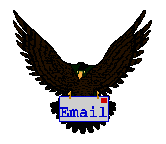 NOTE: The USAF Battlelab Plan for 1998 contains the following:
NOTE: The USAF Battlelab Plan for 1998 contains the following:
UFO is an acronym where "U" stands for UHF
"F" stands for Follow and "O" stands for On (referring to a type of satellite)
This explains the need for the terminology UER/UCT.
It's the latest
wrinkle which REALLY muddies the waters!
USAF BATTLELAB TO IMPROVE SATELLITE DETECTION
By David Atkinson
Defense Weekly 10 August 1998
While the Air Force knows where almost all objects in low-earth
orbit are, it doesn't know exactly where--so the service
wants to improve the way it detects and tracks objects in orbit.
In order to support the Air Force's space control mission,
which aims to secure freedom of maneuver in orbital space for
the United States and its allies, the
Air Force's Space Battlelab at Schreiver AFB, Colo., is
undertaking several studies to improve both initial detection
of orbiting bodies, the way the environment acts on them, and
the methods used to better predict where the objects will be
at any given time.
"Several initiatives are being worked on in space surveillance,"
Lt. Col. Robert Bivins, Commander of the Air Force Battlelab,
told Defense Daily in a recent telephone interview.
The Air Force currently tracks more than 8,000 objects in
orbit. Most are debris, but a large number are satellites,
both U.S. and foreign. In the future, some will belong to or
provide services to enemy states or organizations.
One program, known as Satellite Tracking using Ambient Radio
Frequency (STAR), would use highly sensitive passive
listening systems to pinpoint the position of
satellites
by their reflection of common commercial television and radio
signals.
"The goal is to see a fairly small-sized target out to
1,000 kilometers," Bivens said.
In April, the STAR program began tracking representative
satellites using a large passive array in rural Maryland. The
program is in the design study phase for both fixed and
mobile systems. One of the goals of the program is to free
satellite detection from the large, fixed arrays now used and
make the process both passive and world-wide.
"This is a way, if we were able to put passive detectors
around the world, we would have better situational awareness
[in space]," Bivins said.
[Passive in this sense means no radiated signals that can be
detected by an enemy.]
A final government analysis of whether the program merits
additional research is scheduled for November.
Finding the satellites, however, is not the only problem. The
data and methodology used to track and predict the position
of objects in space can also be improved,
Bivins said.
First, the Space Battlelab is examining whether using
increased processing power to compute the position of an
orbital body will dramatically improve the accuracy of
the track.
"Based on our radar capability, we can only be so accurate,"
Bivins said. The program looks to increase the number of
times per minute that data on objects is collected. "Right
now, we do one observation a minute as it passes through the
SSN [Space Surveillance Network]. If we increase that
exponentially, it should improve our predictions." But,
Bivins pointed out, that will only work if the data put into
the prediction is accurate.
One way that the battlelab is seeking to improve that data is
through the Modified Atmospheric Density Model (MADM)
initiative. This effort will try to improve the modeling of
the effects of atmospheric drag and solar environments on the
path of satellites.
The battlelab is using data from well-known objects in orbit
to determine differences between actual and predicted paths.
The differences can then be extrapolated back and used to
model the environmental effects on other objects in similar
orbital paths.
"Based on our radar capability, we can only be so accurate,"
Bivins said. "The hope is that the environmental prediction
will allow us to improve our accuracy."
That accuracy will not only allow the U.S. Space Command to
keep an eye on its own systems, but will also make the
targeting of hostile satellites easier.
LOSING A FRIEND
VINNIE'S UNTIMELY DEATH
VINNIE'S INTERROGATIONS
SATELLITE INFORMATION
ALIEN INVASION
CANCER DETECTION
COSMIC CONSPIRACY
EOS: NEXT GENERATION
GPS FROM THE USAF
PACHYDERM PATROL
RAPID TARGETING CAPABILITY
SATELLITE OR UFO?
SPACE WARS
UFO RELATED
AREA 51
FOO FIGHTER
WHAT'S A UER?
UFO SHOT DOWN
USAF UFO RELEASE
UFOs & ASTRONAUTS-1 ASTRONAUTS-2
GORDON COOPER-1 COOPER-2
THE MOON
MOON FACTS
WATER ON THE MOON
GENERAL
AIR FORCE READINESS
AIR FORCE ROCKET LAUNCH
HYPERSONIC MISSILE
MICROCHIP IMPLANTS
RUSSIAN BOMBS
TITAN ROCKET EXPLODES
ROSWELL
J.BOND JOHNSON
SYMBOLS?
1947 PHOTOS
Scan 2 Scan 3 Scan 4
Scan 5 Scan 6 Scan 7 
MORE SCANS
RONALD REGEHR
BIO
LINKS
EMAIL
ALIEN CHASER INDEX
 NOTE: The USAF Battlelab Plan for 1998 contains the following:
NOTE: The USAF Battlelab Plan for 1998 contains the following: